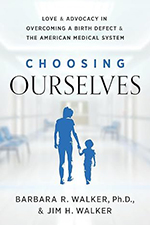Synopsis
In June 1970, my life was working as I’d hoped. At twenty-six, when my son Jim was born with a severe cleft lip and palate, my world turned upside down. Doctors took charge of my son’s medical needs. I felt side-lined, pressured to cope silently and without support. I recoiled when I saw my ten-day-old infant’s battered face after the first surgery. Feedings were traumatic, and I feared Jim would fail to thrive. Emotions I’d never felt before – disappointment, guilt, helplessness, self-loathing, resentment -- overwhelmed me. I shrank from the inevitable stares and insensitive comments. I worried that I had caused Jim’s cleft. My husband was consumed by medical training, so I was on my own for Jim’s medical appointments and hospitalizations. A surgeon dismissed my concerns and efforts. I yearned to be the mother my son needed but could not imagine ever being a positive force in his life. My husband and an insightful pediatrician helped pull me out of this downward emotional spiral and I was able to see the ways I was becoming a competent caregiver. I lost ground when a pediatrician, upset at Jim’s noncompliance, told me I was failing to discipline Jim adequately. Then, I was sure I’d lost Jim’s trust forever when he was four. Without pre-surgical counsel, I had not known to prepare him for how bruised and swollen his face would be immediately after surgery to revise a distorted lip scar. Gradually, I began to advocate for more support to help us weather stressful and often painful experiences. It was a momentous day when I insisted, despite a doctor’s resistance, on a referral for counseling to help Jim deal with depression...








































